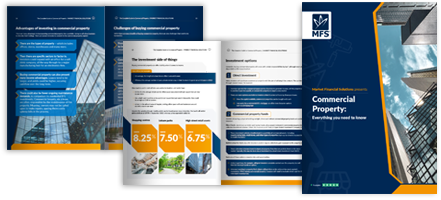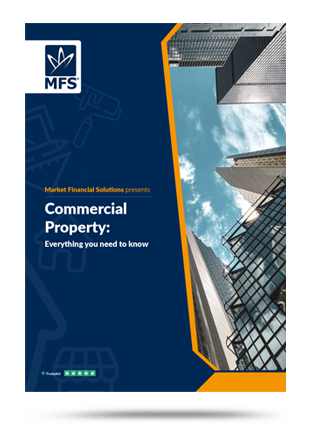Written by Zahira Fayyaz
Head of Key Accounts London & South
Market Financial Solutions are a bridging loan and buy-to-let mortgage provider and are not legal, financial, investment or tax advisers. This document is for informational purposes only and does not, and should not be considered, to constitute legal, financial, investment or tax advice or be relied upon by any person to make a legal, financial, investment or tax decision. Therefore, Investors are encouraged to seek appropriate professional advice. The information in this content is correct at time of writing.

The commercial property market has faced pressure in recent years. Demand for commercial space waned in the face of the pandemic. Prices, in turn, were sent downwards. These issues were also exacerbated by rising interest rates, recession fears, and the September mini-budget fallout.
In the final quarter of 2022[1], UK commercial property dealmaking fell to the lowest level seen in over a decade. Only £7bn worth of deals were transacted, and commercial real estate prices fell by over 15% between June and the winter months.
These difficulties continued into more recent months, affecting markets across the world. In Europe, commercial real estate deal making slumped to a 13-year low in mid-2024[2], while US data showed a 16% decline in deal volumes year-on-year in Q1. But, fortunes may be about to turn in the commercial market.
Is Commercial Property a Good Investment at the Moment?
The question of whether now is a good time to invest in commercial property in the UK is difficult to answer. There will never be a concrete answer to the question of whether an investment is purely good or bad. There are simply too many moving parts to consider.
But, past performance is not indicative of future results. The difficulties facing the commercial property market may soon be behind us. Better days could be on the horizon for those exploring how to invest in commercial property in the UK.
Savills recently found that confidence is returning to the commercial market, setting the stage for a solid rebound in H2 2024[3]. Specifically, yields are holding steady in South East offices, shopping centres, and leisure parks.
Also, Deloitte’s CFO sentiment survey – which can be used as a proxy for investor sentiment – hit +17% in Q1 2024, up from its mid-2022 low of -47%. This, according to Savills, indicates transaction volumes may pick up in the coming months.
What’s more, a looming refinancing shift may necessitate action in the commercial scene over the next year or so. around £71bn in outstanding commercial property debt will need to be refinanced within the coming 12 months, according to Bayes Business School[4]. Some, or much of this debt may need to be refinanced at much higher rates. Some may not even be able to find solutions on the high street, where ICR calculations don’t add up.
The base rate is taking longer to come down than many had hoped. Also, with a new Labour government in power, there is much uncertainty about in the current market.
Fusion to Wait Out the Market
Fortunately, we’re prepared for this at Market Financial Solutions. Our new Bridge Fusion product combines the best aspects of bridging loans and specialist BTL mortgages, offering a solution for investors seeking out a longer-term solution to ride out market uncertainty, and take a wait-and-see approach. Furthermore, there is no ICR requirement with Bridge Fusion, with all loans being assessed on a case by case basis.
In the current market, many investors may want to wait for rates to come down before locking in a long-term option, allowing them to take a step back and keep an eye on commercial demand levels, or provide time to fully digest what impact a new policy may have on a portfolio.
What’s more, our Bridge Fusion loans may be ideal for those who want to invest in commercial property on a larger scale, in a market where that may be hard to come by. Our loans can be put towards hotels, retail, light industrial properties, offices, vacant properties, and more – all of which may be shunned at the moment by hesitant high street lenders.
Our Bridge Fusion product brings a new level of flexibility to the commercial scene, a flexibility that can benefit first-time commercial landlords and portfolio owners alike. All the while, all our borrowers can benefit from deferred/rolled interest payment plans and other tools to boost loan amount where necessary.
In the Middle of Difficulty Lies Opportunity
We mustn’t lose site of the challenges we still have to overcome. But, a post-covid lack of demand may be creating lucrative opportunities for buyers. The tide may be turning against the work-from-home culture that emerged from the pandemic. Many bosses want their employees back in the office[5].
These preferences are coming from some major employers too. Many of which had previously championed the flexible working cause. The likes of Amazon[6], Disney, Tesla[7], Goldman Sachs, and Twitter[8] are all demanding a return to in-person work.
In certain segments of the commercial market, these sentiments appear to be having an impact. Commercial property investment in the City of London hit an 8 year high in January 2023[9], according to Savills. More recently, it emerged that US investors snaped up London’s commercial property at the fastest rate seen in eight years in mid-2024[10].
Also, some City of London law firms tried to lure staff back with tempting incentives. This includes yoga studies, nail bars, and in-office beehives[11].
If this momentum continues, a commercial property rebound may be on the horizon. Demand could rise over the medium-to-long term, pushing up prices once again for investors.
With prices subdued at the moment[12], now may be an opportune time to get involved in the market. Fortunately, there are many options available to property investors to do so.

Semi-Commercial Opportunities Not to Underestimate
Some investors may be wondering how to invest in commercial property in the UK for the first time, and investing in a mixed use or semi-commercial asset may offer an inroad. These kinds of properties can allow borrowers to benefit from business elements, while limiting complete exposure to commercial logistics.
Semi-commercial property investment can involve investing in a pub with a flat above it, or student lets with retail units below, for example. Investors who want to purely focus on the business side of things can instead focus solely on commercial properties.
There is a broad range of options available here. Everything from small offices, through to large industrial complexes fall into this bracket.
To see what options are out there, investors could turn to estate agents who specialise in commercial property. Currently, there are over 1,000 commercial [13]properties on sale in London alone listed on Rightmove.
Turn to Auction Properties
Opportunities can also be found at auctions. Allsop[14], one of the UK’s largest property auction houses, currently has a number of commercial auctions scheduled for H2 2024. Auctions could be beneficial for investors looking for an opportunity to move quickly, or who have a limited budget to work with.
Their investment end-goals should also direct how they invest in the commercial property market. Perhaps they want to buy a commercial property to benefit from the underlying business’ potential. If that’s the case, they may want to examine the company’s books. they could ask themselves, is the industry it’s in sustainable? Has the firm brought in consistent profits?
Or, maybe they want to invest in an empty store, and convert it into a residential home for students. If so, they’ll want to examine the demographics of the area. Is the property in a university town with plenty of students looking for a place to stay? Are there local amenities nearby? Before investing in any commercial venture, investors should do their research, and speak to a professional advisor.
What Are the Advantages of Investing in Commercial Property?
Commercial property presents many opportunities for investors. Chiefly, this includes optionality. There are many answers to the question of how to invest in commercial property in the UK.
There are countless sectors, markets, and audiences out there in the economy. All of which could easily be targeted through property. There are promising opportunities in the UK, even as we face down a challenging economic environment.
Supermarkets, construction contractors, and car dealers may see skyrocketing revenues in 2024[15]. These industries may need more commercial space to grow over the coming months.
Investing in commercial property may also allow investors to diversify. If they’re solely invested in residential property, the commercial world could allow them to expand their portfolio into new areas.
Diversification generally allows investors to spread their risks. If they end up in a position where they’re struggling to find tenants for their residential assets, it might prove useful to have commercial properties still generating income.
Ultimately, commercial property can present just as many opportunities as the residential market can – if not more. Investors will just have to do their homework to determine what industries, geographies, and workforces are worth investing in, and right for them.
But, when they’ve made their choice on how to invest in commercial property in the UK, we’ll be there to support their plans with flexible, speedy specialist finance options.

The Complete
Commercial Property Guide
Everything you need to know
- Extensive introduction
- Lease types
- Regulations & responsibilities
- Finance
[1] https://www.ft.com/content/a0976966-1e64-427d-b165-36e4da21433d
[2] https://www.ft.com/content/7ad47537-f74c-4bce-9d94-248e25ffb15f
[3] https://www.savills.co.uk/research_articles/256536/364161-0/market-in-minutes–uk-commercial—june-2024
[4] https://bridgingandcommercial.co.uk/article/20253/new-commercial-real-estate-lending-hits-10-year-low
[5] https://www.theguardian.com/business/article/2024/jul/12/ive-got-case-uk-workers-fighting-bosses-return-office
[6] https://www.telegraph.co.uk/business/2023/02/17/amazon-orders-staff-back-office/
[7] https://www.mirror.co.uk/money/major-businesses-demanding-workers-return-28918781
[8] https://www.theguardian.com/technology/2022/nov/10/elon-musk-scraps-twitter-work-home-staff#:~:text=Elon%20Musk%20has%20scrapped%20Twitter’s,require%20intense%20work%20to%20succeed%E2%80%9D.
[9] https://uk.finance.yahoo.com/news/city-commercial-property-investment-hits-154154834.html
[10] https://www.proactiveinvestors.co.uk/companies/news/1046590/us-investing-in-london-property-soars-to-highest-rate-in-years-1046590.html
[11] https://www.ft.com/content/95da048a-270f-4dad-8ae9-bba1339a0e79
[12] https://www.reuters.com/world/uk/property-firm-british-land-forecasts-3-5-annual-rental-growth-2024-05-22/
[13] https://www.rightmove.co.uk/commercial-property-for-sale/find.html?searchType=SALE&locationIdentifier=REGION%5E87490&insId=1&radius=0.0&displayPropertyType=commercial&businessForSale=&minBedrooms=&maxBedrooms=&minPrice=&maxPrice=&areaSizeUnit=sqft&minSize=&maxSize=&partBuyPartRent=&maxDaysSinceAdded=&_includeSSTC=on&sortByPriceDescending=&primaryDisplayPropertyType=&secondaryDisplayPropertyType=&oldDisplayPropertyType=&oldPrimaryDisplayPropertyType=&newHome=&auction=false
[14] https://www.allsop.co.uk/auctions/future-auction-dates/
[15] https://www.ibisworld.com/united-kingdom/industry-trends/biggest-industries-by-revenue/




